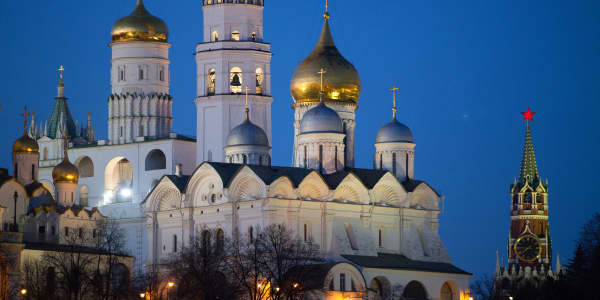Things could be about to get even tougher for ordinary Russians, with rampant inflation and a reduction in real wages in the country meaning that more than half of their annual income could be spent on food.
A report by Russian bank VTB Capital into food retail warned the dire situation was set to be exacerbated by rising inflation, which it said could pass 20 percent soon.
"In 2015, we forecast household consumption to slide 8.5 percent year-on-year and average food inflation to total 18 percent year-on-year, peaking at 21.6 percent year-on-year in the first quarter of 2015," VTB analysts Maria Kolbina and Nikolay Kovalev said in the report, released Friday.
"As a result, the share of food in consolidated household budgets is to rise further from 46 percent to 50-55 percent by autumn."
Over the last 12 months, Russia's economy has been severely affected by the fall in global oil prices and Western sanctions imposed on the country for its part in the Ukraine conflict. Restrictions on food imports and the dramatic slump in the ruble – down over 40 percent against the dollar over the last year - have pushed up the rate of inflation, piling pressure on Russian consumers.
The rate of inflation soared to 15 percent in January, indicating that attempts by the Russian central bank to stem price growth -- by increasing interest rates up to 17 percent in December – were not working.
Read MoreRussia cuts vodka prices on moonshine fears
Russian consumers have taken to social media site Instagram to lament the prices rises, using a hashtag which translates as "#pricesarebiting." One user, Vika_kalina1985, posted an image of a watermelon with the price of 2360.20 rubles – or $37.9 dollars – and another, innaborovenskaya, posted a picture of a basket of fruit saying: "Prices are shocking."
Russia's retailers have been quick to react to the price rises, however, with twelve retail chains signing up to an initiative to freeze prices on 20 "socially important" foodstuffs for two months, the Association of Retail Stores (AKORT) said last week.
The signatories wanted to "stabilize the situation on the food market," AKORT said in its statement, which did not specify what goods were considered "socially important."
Win-win for retailers?
While the rise in food prices poses bad news in consumers, VTB said the "upcoming year offers Russian food retailers an unparalleled operating environment," and provided "an opportunity out of adversity."
"The challenges of a more fragile consumer backdrop and need for further price investments are to be offset by tailwinds from high food inflation and further consolidation opportunities. We see food retail turnover growing 12 percent year-on-year in 2015 and non-food categories to stay flat," the analysts said.
Read MoreRussia protests:What they could mean for Putin
The bank forecast that Russia's largest retailers, including Magnit, Dixy and X5 Retail Group, would benefit from the changing consumer environment and would continue to open smaller stores.
However it did notice that downside risks were present for retailers. These included, "stronger hits on private spending, the start of irrational promos, introduction of price controls and persistent elevated local rates."
- By CNBC's Holly Ellyatt, follow her on Twitter @HollyEllyatt. Follow us on Twitter: @CNBCWorld






